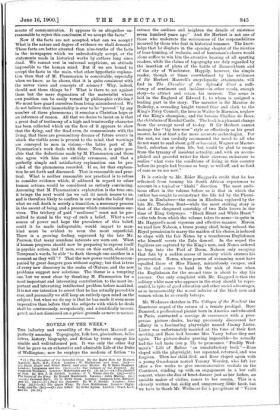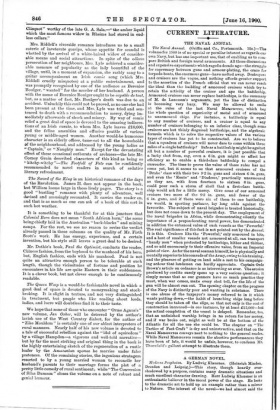NOVELS OF THE WEEK.*
THE industry and versatility of Sir Herbert Maxwell are perfectly amazing. Topography, folk-lore, pisciculture, belles lettres, history, biography, and fiction by turns engage his nimble and well-informed pen. It was only the other day that he gave us an exhaustive and admirable Life of the Duke of Wellington; now he employe the medium of fiction "to • (1.) The Chevalier of the Splendid Crest. By the Right Hon. Sir Herbert Maxwell, Bart., M.P., F.R.S. London : W. Blackwood and Sons. [Gs.j- (2.) Black Heart and White Heart, and other Stories. By H. Rider Haggard. London : Longmans and Co. [6s.]—(2.) The Collapse of the Penitent. By Frederick Wedmore. London : Hutchinson and Co. [3s. 6d.]—(4.) The Footfall of Fate. By. Mrs. J. H. Riddell. London : F. 'V. White and Co. [Ce.]--(5.) Vte Sward of the King. By Ronald Macdonald. London : John Murray. [65.] —(6.) colonial Born. By G. Firth Scott. London : Sampson Low, Marston, and Co. [ea]—(7.) Paul the Optimist. By W. P. Dothie. London : John Long- [68.]—(8.) The Queen Wasp. By Jean Middleman. London :
Long, and Co. [68.]--(9.) Jan Oxber. By Orme Agana. London : Ward, Lock,
retrace the outlines and heighten the details of existence seven hundred years ago." And Sir Herbert is not one of those who underrate the seriousness of the responsibilities incurred by those who deal in historical romance. The know- ledge that he displays in the opening chapter of the niceties of boar-hunting, of recheats, and of huntsman's cheers would alone suffice to win him the attentive hearing of all sporting readers, while the claims of topography are duly regarded by the insertion of plans of the battle of Bannockburn and of the city of Winchester. Happily, however, the simple reader, though at times overwhelmed by the evidences of Sir Herbert Maxwell's encyclopedic attainments, will find in The Chevalier of the Splenslid Crest a suffi- ciency of sentiment and incident—in other words, enough story—to attract and retain his interest. The scene is laid in the England of Edward I., to whom is assigned a leading part in the story. The narrator is Sir Maurice de Bulkeley, a crusading knight turned friar and clerk to the King's Privy Council; the hero is Walter le Marmion. nephew of the King's champion ; and the heroine Challice de Roos, the cluftelaine of Kendal Castle. The book is a pleasant change from the average novel of to-day. If Sir Herbert cannot manage the "big bow-wow" style as effectively as his great master, he is at least a far more accurate arclueologian. For the rest, we can cordially recommend the novel to all who do not want to read about golf or baccarat, Wagner or Maeter- linck, suburban or slum life, but would be glad to escape from the tyranny of insistent actuality, and, with an accom- plished and graceful writer for their cicerone, endeavour to realise "what were the conditions of living in this country before its people had become so busy, so well-off, and so fond of ease as we are now."
It is entirely to Mr. Rider Haggard's credit that he has refrained from turning his South African experiences to account in a topical or " khaki " direction. The most ambi- tious effort in the volume before us is that in which the author has sought to reconstruct the life led by the Pheeni- cians in Zimbabwe—the ruins in Rhodesia explored by the late Mr. Theodore Bent—while the most striking story is that of the chequered courtship of two Zulu lovers in the time of King Cetywayo. "Black Heart and White Heart" —the tale from which the volume takes its name—is quite in Mr. Haggard's most vigorous and effective manner. Herein we read how Nahoon, a brave young chief, being refused the Royal permission to marry the maiden of his choice, is induced to elope with the fair Nama by a treacherous Englishman who himself covets the Zulu damsel. In the sequel the fugitives are captured by the King's men, and Name ordered to leap into the Pool of Doom, Nahoon only escaping that fate by a sudden access of insanity which ensures his preservation. Nanea, whose powers of swimming must have equalled those of Miss Finney, miraculously escapes, and in the end comes to hand in the nick of time when the Englishman for the second time is about to slay his rescuer. Our only complaint with Mr. Haggard is that the solitary white man who appears in the story should be repre- sented, in spite of good education and other social advantages, as so immeasurably the moral inferior of the black men and women whom he so cruelly betrays.
Mr. Wedmore sketches in The Collapse of the Penitent the disastrous sequel of the return of a female prodigal. Rose Damerel, a professional pianist born in America and educated in Paris, contracted a mariage de convenance with a pros- perous picture - dealer, having previously discovered her affinity in a fascinating playwright named Jimmy Lister. Lister was unfortunately married at the time of their first meeting, and Rose had become Mrs. Vasey before they met again. The picture-dealer proving impossible—he actually had the bad taste (see p. 71) to pronounce "Freddy Wed- more's " Life of Balzac "an unsatisfactory book "—Rose eloped with the playwright, but repented, returned, and was forgiven. Then her child died, and Rose eloped again with a young Guardsman named Tommy Worsley, who left her after a few weeks to give unremunerative recitals on the Continent, winding up with an engagement in a low café. concert, where she dies of heart-disease just as her father, an amiable maker of violins, comes to her rescue._ This is a cleverly written but sickly and unnecessary, :little kook, but we have to thank Mr. Wedmore for a paraphrase of " Veuve Clioquot " worthy of the late G. A. Sala,—" the amber liquid which the most famous widow in Rheims had stored in end- less cellars."
Mrs. Riddell's riverside romance introduces us to a small coterie of inveterate gossips, whose appetite for scandal is whetted by the arrival of a white-haired widow of consider- able means and social attractions. In spite of the odious persecution of her neighbours, Mrs. Lyle achieved a consider- able measure of popularity as the lady bountiful of the village, until, in a moment of expansion, she rashly sang to a guitar accompaniment an Irish comic song (which Mrs. Riddell cruelly misquotes) at a public entertainment, and was promptly recognised by one of the audience as Berenice Boulger, " wanted " for the murder of her husband. A person with the name of Berenice Boulger ought to be capable de tout, but, as a matter of fact, Mr. Boulger's death was due to an accident. Unluckily this could not be proved, as no one else had been present at the time, and Mrs. Lyle was tried and sen- tenced to death with a recommendation to mercy, dying im- mediately afterwards of shock and misery. By way of comic relief a great deal of space is devoted to the amazing indiscre- tions of an Irish curate, to whom Mrs. Lyle leaves 210,000, and the feline amenities and effusive prattle of various young or middle-aged women. Another would-be humorous character is an elderly officer, tame-cat to all the households of the neighbourhood, and addressed by the young ladies as "Captain," or "Naughty man." Except for the devastating effect of these occasional outbursts of archness—the late Mr. Come,' Grain described characters of this kind as being so " kitchy-witchy "—The Footfall of Fate can be confidently recommended to novel readers in search of sedative literary refreshment.
The Sword of the King is an historical romance of the days of the Revolution. James II. does not appear in the book, but William looms large in these lively pages. The story is a good " bustling " romance with plenty of adventure, well devised and amusingly recounted. It carries the reader on, and that is as much as one can ask of a book of this sort in such hot weather.
It is something to be thankful for at this juncture that Colonial Born does not mean "South African born," the scene being chiefly laid in the Australian "back-blocks" and mining camps. For the rest, we see no reason to revise the verdict already passed in these columns on the quality of Mr. Firth Scott's work. He has energy, experience, and a certain invention, but his style still leaves a great deal to be desired.
Mr. Dothie's book, Paul the Optimist, conducts the reader, Chinese fashion, from the boyhood to the manhood of his hero, but, English fashion, ends with his manhood. Paul is not quite an attractive enough person to be tolerable at such length, though the vicissitudes of fortune and position he encounters in his life are quite Eastern in their suddenness. It is a clever book, but not clever enough to be continuously readable.
The Queen Wasp is a would-be fashionable novel in which a good deal of space is devoted to moneymaking and stock- broking. It is slight in texture, and not very distinguished in treatment, but people who like reading about lords, ladies, and lucre will doubtless find it to their taste.
We hope that none of those who encounter" One Agnus's " new volume, Tan Ozber, will be deterred by the author's lavish use of the West Country dialect, for the author of " Zike Mouldom " is certainly one of our ablest interpreters of rural manners Nearly half of his new volume is devoted to a tale of successful rebellion against the "idol of squiredom " by a village Hampden—a vigorous and well-told narrative— but by far the most striking and original thing in the book is the highly entertaining sketch of the regeneration of a rustic loafer by the Amazonian spouse he marries under false pretences. Of the remaining stories, the ingenious stratagem resorted to by a young married woman to reconcile her husband's parents to their marriage forms the plot of a pretty little comedy of rural sentiment; while "The Conversion of Silas Damson" closes the volume on a note of robust and genial humour.







































 Previous page
Previous page